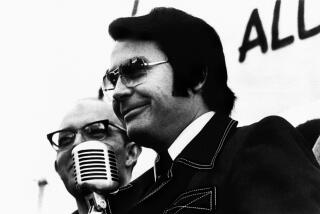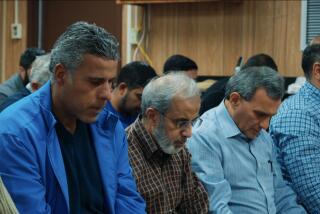‘Islam: Empire of Faith’ Keeps Eye on Culture, Not Religion
- Share via
NEW YORK — The PBS documentary “Islam: Empire of Faith” is billed as the Public Broadcasting Service’s first-ever program to address the history and culture of Islam, the religion claimed by nearly one-fourth of the world’s population and about 7 million people in the U.S.
Airing tonight at 8 on KCET, the sweeping 2 1/2-hour production provides a broad outline of Islamic civilization’s first 1,000 years through the use of vivid reenactments filmed in Iran and elsewhere.
Starting with the birth of the prophet Muhammad, the program looks at the early writing of the Koran, the creation of the first mosque, early military triumphs that gave Islam forward momentum and, ultimately, the establishment of an empire larger than Rome. The program explores the intellectual life that flourished in Islam at a time when Western Europe was in the darkest Middle Ages, and Islamic contributions to science, medicine and the arts that predated more widely known advances of Renaissance Europe.
What the program leaves out, notably, is religion, which is dealt with at times only tangentially. There is no exploration of the split between Sunni and Shiite Muslims, or the spread of Islam to areas such as Indonesia and India. Narrator Ben Kingsley explains in the opening, “For the West, much of the history of Islam has been obscured behind a veil of fear and misunderstanding,” but that is as far as the program goes in touching on some of the more radical interpretations that Islam has taken on in a few countries today.
Award-winning producer and director Rob Gardner says that despite a $1.54-million budget, high for public television, “there were a lot of areas we just didn’t have the money to go to. Television always involves a lot of compromise.”
Because of financial constraints, what was planned as four hours eventually got whittled down to under three. Plans to take the project through the 1920 discovery of oil in Iraq and give it greater geographical scope were cut back.
Gardner, who won a DuPont award for PBS’ “Arab and Jew: Wounded Spirits in a Promised Land,” says that when PBS approached him three years ago, his team researched various approaches to Islam--including looking at contemporary politics--before deciding that “the most interesting, least known was the historical arc of the first 1,000 years. Most Americans aren’t familiar with this.”
Although any study of Islam can’t completely ignore religion, “there was a very strong feeling that what we wanted to tell here was a historical and cultural story,” Gardner says. “To make people understand the religion would be very, very complicated.”
Responding to critics who have said the documentary ignores more difficult contemporary issues, Gardner says: “A lot of what people think of as Islamic issues really have to do with contemporary politics, issues of economics, post-colonialism, ideology, terrorism and extremism. A lot of these things come from the 20th century and don’t relate to our story, which ends in the 16th century.”
Moreover, he says, “Religion is often hijacked by ideologues, and that happens in Islam too. Instead of hearing about the Muslim dentist down the street, we’re hearing about the Taliban in Afghanistan. That doesn’t define the culture.”
The production filmed in seven countries, including visually rich historical reenactments, from Bedouin camps to battle scenes on horseback. The re-creations, using some 300 costumes, were done largely in Iran.
One scene ended up being edited at the request of the Council on American-Islamic Relations. The organization objected to an image of the prophet Muhammad, which went against Islam’s ban on representations of prophets.
More to Read
The complete guide to home viewing
Get Screen Gab for everything about the TV shows and streaming movies everyone’s talking about.
You may occasionally receive promotional content from the Los Angeles Times.






